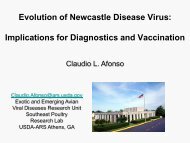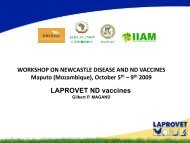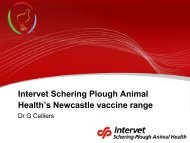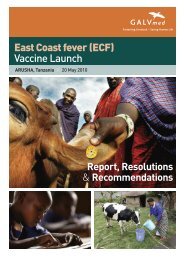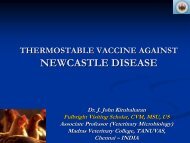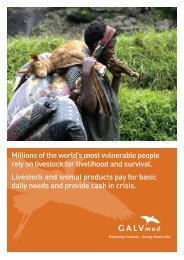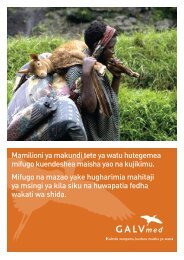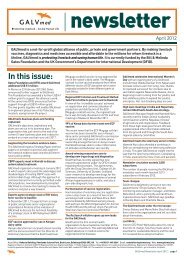A Path to Prosperity New Directions for African Livestock
GALVmed Impetus Strategy Paper
GALVmed Impetus Strategy Paper
- No tags were found...
Create successful ePaper yourself
Turn your PDF publications into a flip-book with our unique Google optimized e-Paper software.
Calls <strong>for</strong> the recognition and use of paravets<br />
including CAHWs are unlikely <strong>to</strong> die away whilst a<br />
gap in veterinary service delivery and disease<br />
surveillance remains across large areas of rural<br />
Africa.<br />
Most contribu<strong>to</strong>rs agreed that World Organisation<br />
<strong>for</strong> Animal Health (OIE) guidance on how paravets<br />
should operate was useful and appropriate 2 .<br />
The Terrestrial Animal Health Code is quite clear<br />
that it is the responsibility of the Veterinary Statu<strong>to</strong>ry<br />
Body, normally termed the Veterinary Council or<br />
Veterinary Board, of each country <strong>to</strong> register/licence<br />
veterinarians and veterinary para-professionals.<br />
E-discussion correspondents called <strong>for</strong> effective<br />
supervision and follow up, improved trust and<br />
flexible legislation <strong>to</strong> govern the use of veterinary<br />
para-professionals, including Community Animal<br />
Health Workers (CAHW).<br />
The OIE advised that it has been developing a basic<br />
standard covering veterinary legislation in OIE<br />
Member Countries. This move has been in response,<br />
at least in part, <strong>to</strong> requests from some<br />
<strong>African</strong> countries.<br />
Continual Professional Development [CPD] of both<br />
vets and paravets was suggested as one way <strong>to</strong><br />
ensure continual supervision of veterinary<br />
para-professionals, cascading down <strong>to</strong> the basic<br />
levels such as CAHWs. It was suggested that those<br />
vets or paravets who do not carry out the CPD would<br />
be penalised through “loss of registration / licence <strong>to</strong><br />
deliver services”.<br />
E-discussion correspondents put <strong>for</strong>ward<br />
interventions <strong>for</strong> consideration within any plan <strong>to</strong><br />
enhance the quality, impact and sustainability<br />
of veterinary services A . Most participants felt the<br />
OIE PVS mechanism, the new Interafrican Bureau of<br />
Animal Resources [AU/IBAR] veterinary governance<br />
project and IBAR’s strategy <strong>for</strong> lives<strong>to</strong>ck development<br />
in Africa were key opportunities <strong>to</strong> build upon.<br />
As advocated in the Impetus Strategy Paper, the OIE<br />
PVS <strong>Path</strong>way received particular support as a<br />
programme <strong>for</strong> the sustainable improvement of a<br />
country's Veterinary Services and their compliance<br />
with OIE standards. It was noted that PVS remains<br />
an important foundation <strong>for</strong> improving animal<br />
health, public health and compliance with sanitary<br />
and phy<strong>to</strong>-sanitary standards, at the national,<br />
regional and international levels.<br />
2 http://www.oie.int/international-standard-setting/terrestrial-code/<br />
It was observed, in line with the findings of the ISP,<br />
that whilst drug regulation had been harmonised<br />
and improved in some regions, it is not en<strong>for</strong>ced and<br />
there<strong>for</strong>e inadequate. Contribu<strong>to</strong>rs confirmed that<br />
drug acquisition remains largely in<strong>for</strong>mal and the<br />
quality of drugs continues <strong>to</strong> fall. Various solutions<br />
ranging from training drug vendors, <strong>to</strong> building<br />
branded franchise enterprises (Sidai Africa Ltd) and<br />
ensuring drug registration authorities have an<br />
incentive <strong>to</strong> change the way they do business,<br />
were put <strong>for</strong>ward.<br />
It was pointed out that the ISP talks of ‘low quality<br />
generic’ drugs when it would be more accurate <strong>to</strong><br />
talk about the quality of generic medicines,<br />
counterfeit medicines and brand name medicines.<br />
Fake medicines by definition are not even medicines.<br />
In response <strong>to</strong> a question about how <strong>to</strong> control<br />
neglected zoonoses, participants commented that<br />
effective control requires more than improved<br />
education and infrastructure. Partnerships with<br />
other sec<strong>to</strong>rs, particularly human health, but also<br />
agriculture, environment, education, local<br />
administrations, will be necessary <strong>to</strong> contain and<br />
effectively control zoonotic and food borne diseases<br />
that mainly affect the poor. Complimentary<br />
biosecurity measures on farms, lives<strong>to</strong>ck markets,<br />
slaughtering facilities and the control of lives<strong>to</strong>ck<br />
movement along with surveillance and vaccination<br />
programmes were also advocated.<br />
3 Feeding Africa’s Ruminants <strong>for</strong> food<br />
security and prosperity<br />
The Impetus Strategy Paper (ISP) advocated the<br />
need <strong>for</strong> Sub Saharan Africa <strong>to</strong> maximise its use of<br />
human inedible feeds and optimise its use of crop<br />
by-products <strong>to</strong> improve ruminant nutrition. Africa<br />
has relatively abundant supplies of cereal residues<br />
such as straw and s<strong>to</strong>ver. Correspondence on the<br />
<strong>to</strong>pic confirmed that ruminant nutrition is a problem<br />
in SSA. The link between health and nutrition was<br />
made by several people. Participants observed that<br />
concentrate feeds on sale in the market place<br />
commonly do not contain the nutrients advertised.<br />
Furthermore pasture available <strong>for</strong> extensively grazed<br />
s<strong>to</strong>ck is diminishing due <strong>to</strong> encroachment of crop<br />
production in<strong>to</strong> grazing areas. Pas<strong>to</strong>ralist<br />
communities are particularly affected by restricted<br />
access <strong>to</strong> their traditional grazing lands. As it is<br />
extremely difficult <strong>to</strong> reseed or improve pastures in<br />
dryland areas they face difficult choices about<br />
their future viability. The idea of fodder banks was<br />
put <strong>for</strong>ward as one possible solution.<br />
The Impetus Strategy Paper I Page 80



